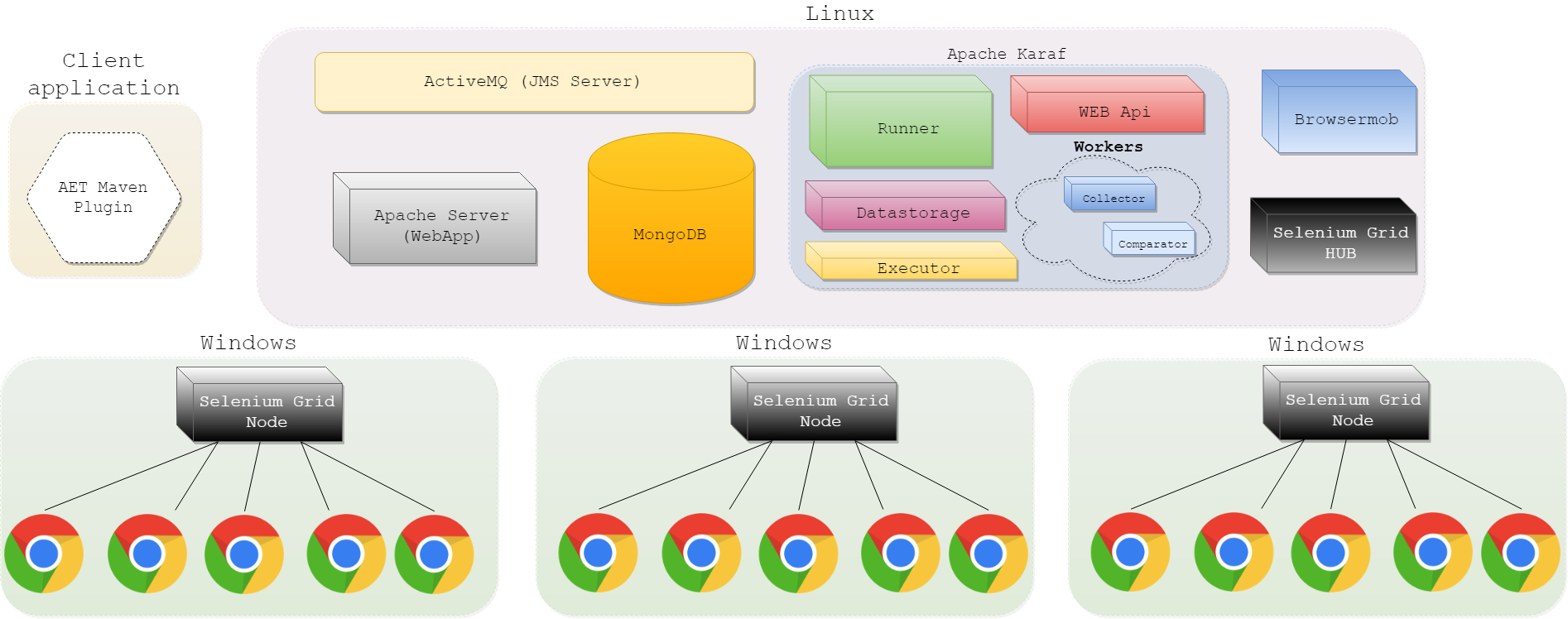-
Notifications
You must be signed in to change notification settings - Fork 47
AdvancedSetup
This section describes advanced setup of AET using Linux and Windows.
Please note that full list of required tools and its versions can be found in System Components section.

For Linux environment setup, use the AET Cookbook which provides following services:
- Karaf with AET service running
- MongoDB as the database
- ActiveMQ as the message broker
- BrowserMob as the proxy server
- Selenium Grid Hub (that later Windows nodes will be attached to)
- Apache Server with the Report app
Prerequisites
- Chrome browser
- ChromeDriver (version 2.40 or newer)
- Selenium Standalone Server (version 3.41 or newer)
Start Selenium Grid node
Run following command to start selenium grid node process on windows machine:
java -Dwebdriver.chrome.driver="<path/to/chromedriver>" -jar <path/to/selenium-server-standalone.jar> -role node -hub http://<linux-ip>:4444/grid/register -browser "browserName=chrome,maxInstances=20" -maxSession 20
Running the selenium grid node process as a Windows service is not recommended - it's causing some issues for driver which runs Chrome in headless mode. However this issue does not occur if you configure the node process as a Windows startup program.
Optional Software
On Windows you can also install Baretail and Notepad++ for viewing logs and configuration files.
This section describes how to configure the AET OSGi services so that they could connect to the appropriate system components.
The services are configured through the Karaf Web Console which is hosted on Linux machine. Assuming that this machine's IP address is 192.168.0.1,
the Karaf console is available under following address: http://192.168.0.1:8181/system/console/configMgr.
Assuming that most of the system components are running on a single machine
(e.g. provisioned by AET Cookbook) then those
components can work correctly either with default localhost configurations,
or with a configuration that points to Linux machine IP.
Those configurations are:
- ActiveMQ broker URL in
AET JMS Connection - ActiveMQ JMX endpoint UR in
Messages Manager Configuration - Mongo URI property in
AET MongoDB Client - Selenium Grid URL property in
AET Chrome WebDriver Factory
OSGi configurations which need to be configured with environment-specific values are:
-
AET Rest Proxy Manager- theserverproperty needs to be set to IP address of the Linux machine. This address is used by the Selenium Grid nodes and needs to be accessible for the Windows machine(s). -
AET Report Application Configuration- thereportDomainproperty should be set to a domain of Apache server which hosts the AET Report application - e.g.http://aet-report
The service is AET Workers Listeners Service.
To enable proper working of AET instance, you should configure at least 1 collector and 1 comparator.
| Property name | Default value | Comment |
|---|---|---|
| Number of collector instances | 5 |
Might be overwritten by env variable COLLECTORS_NO
|
| Collectors prefetch size | 1 |
Read more here |
| Number of comparator instances | 5 |
Might be overwritten by env variable COMPARATORS_NO
|
| Comparators prefetch size | 1 |
Read more here |
Important note Number of collector instances should be the number of browsers available through all Selenium Grid Nodes.
The AET Chrome WebDriver Factory component configuration (chromeOptions property) allows you to configure a list of options/arguments
which will be passed to the Chrome browser binary. The default list of Chrome options is: --disable-plugins, --headless, --hide-scrollbars, --disable-gpu.
-
How To Use
-
Releases